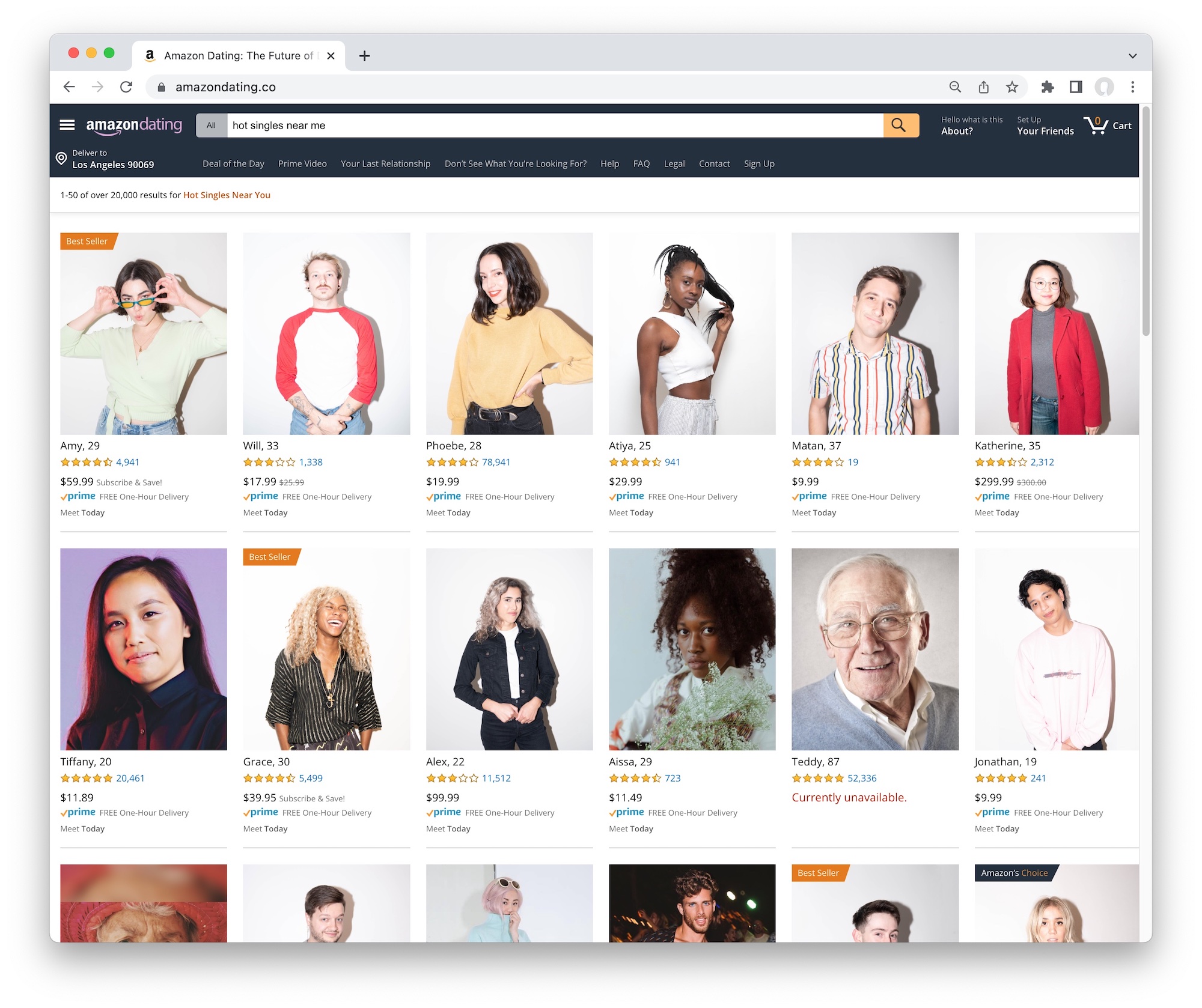Why dating apps don’t work
Online dating is like online shopping for a partner.
The promise was simple: Just select your criteria, browse some profiles, then add to cart, 1-click, checkout!
Customize your future partner like a video game character! Pick their gender, age, height, and educational attainment (unlock attractiveness, religion, and race with a Pro™ subscription of only $34.99 per month).
Ta-da! Your perfect partner, mint from the factory, encased in plastic, delivered to your door with free 2-day shipping.
 Figure 1: A typical online dating app1
Figure 1: A typical online dating app1
In my previous article, friendships form via shared context, not shared activities, I claim that any skill or attribute you bring to a friendship—“I’m really funny”, “I’m good at shining shoes”, “I’m an attentive lover”—can always be replaced with someone better than you on that dimension. They’re funnier, fitter, richer, sexier, smarter, or better at shining shoes than you are.
But a real friend is someone who has things that can’t be listed on a résumé: trust, loyalty, love, belonging, safety, and a sense that they’ll back you up when the times get tough. Real friends reveal themselves only as part of a vibrant network of mutual aid, promises, commitments, and favours owed to others.
Dating apps kidnap you from your community, exiled into a 2 inch photo where you swipe only on externally visible attributes, totally devoid of families, friends, shared history, and collective responsibility.
Is it surprising you feel dehumanized when you are auctioned alone at a scramble, stripped of your social context?
So many of these dates were just people plucked out of a random void and returned to that void after.
Every conversation is a 1:1 interview, a careful performance to advertise your “best” self lest you be disposed of and replaced with any one of the thousands of other people who look exactly like you.
Ripped from your context, there’s nothing to talk about except for externally visible attributes. There’s certainly no expectation of any shared responsibility to help each other.
Without an interconnected social network, there are few consequences for ghosting, dick pics, stalking, or lying about relationship status. But if you dated a friend, a friend would never ghost you. That would simply be unthinkable, because they risk banishment by the rest of your friends.2
You can’t get too invested in any one person, because they might ghost you later. It’s much safer to boost your own attractiveness instead, so you can sit atop your pedestal and do the ghosting with impunity.3
Every hobby becomes an opportunity to collect attractive skills and traits, so you can advertise them later, like the features of a product on its marketing page.
As a result, everyone is beautiful but no one is horny.
People want to be fuckable more than they want to fuck.
Today, I approach dating less like an interview and more like a collaboration. I don’t take my dates out for coffee, dinner, or drinks. Instead, I’ll search for ways to trade favours, run errands together, or sign up as gym accountability buddies.
In my dating profile, I no longer talk about what I bring to the table and the kind of person I’m looking for—that’s too much like a résumé and cover letter.
For a woman I’m interested in romantically, I’ll think about how to invite her into the friendship quilt. How can she help one of my friends? What favours can I do that she will appreciate?
This approach takes the pressure off anyone I’m interested in from feeling unworthy, or feeling beholden to checking some secret checkbox. It’s also significantly less stressful for me to simply paint a picture of the type of life I’m interested in building together, and leaving it open to anyone who resonates with it.
But I think the Spice Girls said it best:
🎵 If you wanna be my lover, you gotta get with my friends 🎶
I only publish half of my writing publicly. Subscribe to my private email list to read articles that were too sensitive to share online: billmei.net/follow (Subscribing is free, no spam ever, and you can safely unsubscribe anytime)
Footnotes
-
Image credit: amazondating.co ↩
-
Of course, there are individuals who decide to behave well out of a good internal moral compass, but counting on them is like trying to solve climate change by counting on individuals to reduce their carbon footprint. ↩
-
Strategic ambiguity fills a lacuna of accountability:
You go on a first date, probably at a cafe, a bar, or dinner, and talk to the person for 1 to 4 hours. You learn about shared interests, job, which college they went to, their friend group. You may or may not learn what they’re “looking for.” If given, the description of what they want usually falls into one of three categories, with the third being the most common—1) I’m not looking for something serious 2) I’m looking for a serious partner and 3) what I’m looking for changes depending on how much I like you, let’s wait and see.
